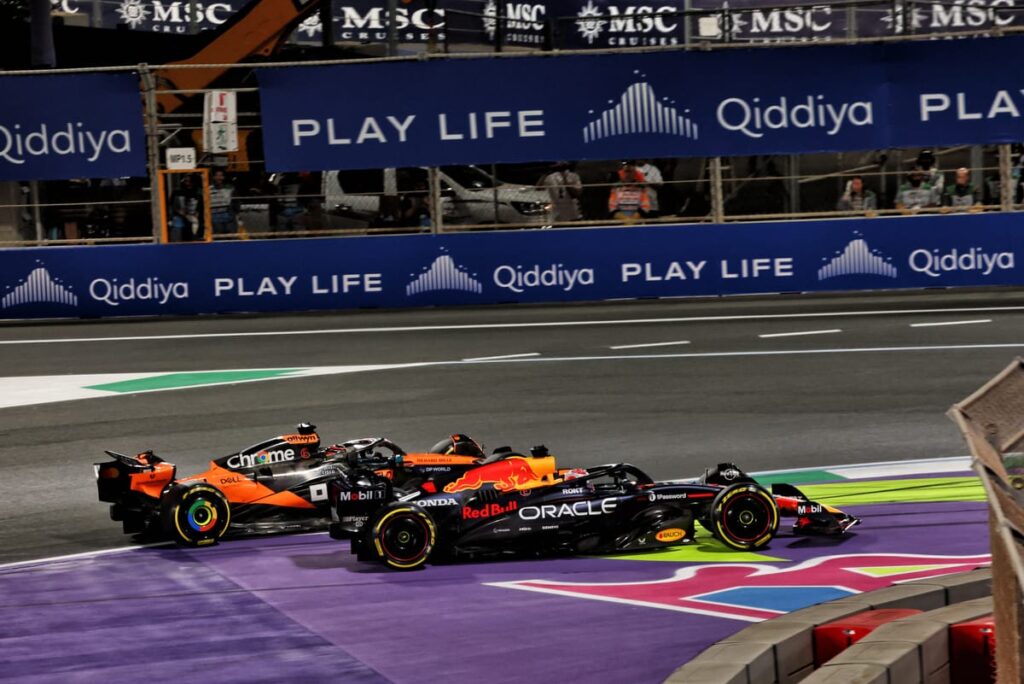
Verstappen controversy highlights need for an F1 penalty change – The Race
2025-04-22T11:28:13Z
The best solution in the Jeddah Turn 1 row was one the F1 officials have stopped using
Amid arguments over whether or not Max Verstappen deserved the penalty that ruined his chances of victory in Formula 1’s Saudi Arabian Grand Prix, there’s a key overlooked component of the controversy.
That’s the F1 stewards issuing a five-second penalty, when there could be a solution that creates better racing and solves some of the long-standing problems time penalties can bring.
“The penalty was right – 10 seconds would have been harsh – but I also feel slightly uncomfortable with this transition they’ve had to not advising people to give positions back,” Jon Noble said on the latest episode of The Race F1 Podcast.
“I personally don’t like it, I would much prefer a situation where race control says you can give the position back – ‘We believe you should do it’ – and give them that option, rather than leave it up to them [the drivers] and suddenly it goes to the stewards and it’s a penalty.
“We get trapped in this world too often.”
This could be at the discretion of the F1 race director Rui Marques – the late race director Charlie Whiting used to advise teams on whether their drivers should give back a place to avoid a penalty from the stewards.
It wasn’t a perfect system; teams in fact pushed for clearer-cut penalties. But it avoided situations such as the penalty that robbed us of a lead fight in Jeddah.
Such instructions to swap positions back could also become part of the stewards’ remit.
“A stewards’ verdict [could] be to swap the positions back, and if you have subsequently gained a further advantage by overtaking other cars, well, so be it,” Scott Mitchell-Malm said.
“That didn’t apply in this case, but it might somewhere else in the field. If you’ve gone from seventh to fourth or whatever, for example. Why isn’t it an option for the stewards?
“I actually think that would be quite a valid thing for them to have in their arsenal, with time penalties, which we constantly argue are either meaningless or too harsh, or if you get one and there’s a safety car finish and something like that, like at Melbourne [2023, where a five-second penalty dropped Carlos Sainz from fourth to 12th], it would eradicate all of that wouldn’t it?
“You’d just fall behind the car you [did it to]. It wouldn’t be perfect, but you could apply it in certain situations.
Mark Hughes: Verstappen would’ve won if stewards let him off Read more
“Everything happens at the stewards’ discretion anyway, so I think that would be a neat way of doing it.
“It would have reset the board quite nicely. You’d then have Verstappen right on Piastri’s tale at the resumption of the grand prix or right after.”
It could prevent drivers from gaming the system. While Verstappen didn’t have the pace to pull away from Piastri, had his Red Bull had a pace advantage, it would have been beneficial to force his way past Piastri, take the five-second penalty, and use the clean air to negate it.
“If Max had been told to give the position back – ‘You’ve got to be second’ – I think the arguments wouldn’t be as emotional now because everything would have reset,” Noble added.
“Max would have been second, could have potentially tried the undercut in the race if the pace was there, and could have actually come out and won the race. That’s not an impossible scenario based on the pace of those cars.
“I think as a sporting spectacle, maybe this is something that should be looked at – in terms of if it goes to the stewards and you can have the option of giving the place back, or if you’ve not done it in three laps, you get your penalty.”
It’s partly a consequence of F1’s pivot to more tightly defined regulations but, as ever with something as fluid and dynamic as racing, a flexible approach can sometimes be more effective.
That’s where Whiting used to be so effective. He helped find a balance to racing rules that F1 still appears to be too hit and miss with.
Auto-posted from news source




